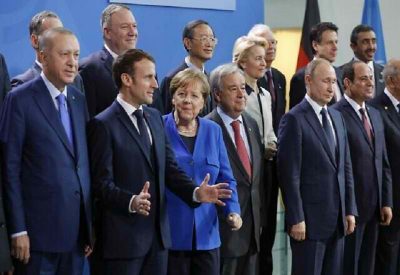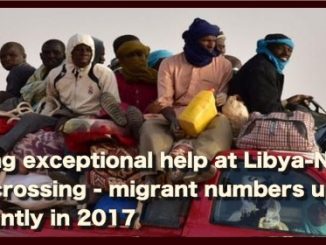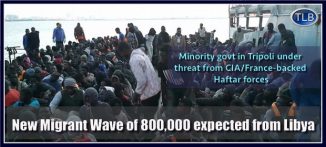
ER Editor: We also recommend this piece by Steve Brown for The Duran, titled Berlin Summit on Libya Folds with a CIA Reunion. The summit, held in Berlin to resolve the impasse between Libya’s General Haftar (LNA, based in Benghazi but ready to take the country militarily) and PM al-Sarraj (GNA, based in Tripoli, recognized by the UN, supported actively by Turkey, and ready to lose), resulted merely in a UN arms embargo and a ceasefire. Summing things up, Brown notes:
When liar, thief, and ex-CIA director Pompeo was announced as an attendee to the proposed Libya ceasefire summit in Berlin, all hope for any political settlement died. Besides a photo-op for Merkel, Macron,
and various other global miscreants and incompetents, the 19 January Berlin event was most notable as a high-five meet-up for one former CIA asset (ER: General Khalifa Haftar, pictured) and his ex-director. But whether Warlord Khalifa and CIA Mike danced together to the Los Guerreros tune We Lie, We Cheat, We Steal is, as yet, unknown. Drinks all around anyway.
…
The only resolution made by conference participants is that all nations must adhere to the UN arms embargo and ceasefire, which CIA buddies Pompeo and the Warlord must have laughed into their beer about. So, the Berlin conference was more of a Bohemian Grove irrelevance based on globalist ritual than a real search for political solutions to the crisis in Libya. Being the crisis that the United States and NATO engineered some nine years ago.
Haftar (LNA) putting a blockade on most of the Libyan oil reserves he controls is one of the current problems, especially for Turkey and Italy:
One very serious question now is about how Turkey and Italy will deal with the LNA Libyan oil blockade. Whether the blockade will cause hostilities to resume is unclear, but Libyan oil has been bargain-basement cheap for Turkey and Italy for quite some time now. If the LNA oil blockade persists, that will likely push Turkey closer to Algeria – a goal Turkey has been courting for some time.
Korybko below notes that the blockade represents a significant loss of revenue for the GNA government in Tripoli, which may soon necessitate Turkish financial intervention.
********
General Haftar Still Holds All the Cards After Berlin’s Libya Summit
A Lot Of Blah-Blah In Berlin
ANDREW KORYBKO

Berlin’s Libya summit ended without any real changes to the status quo despite all relevant foreign parties to that country’s civil war superficially agreeing to some key points such as the need to abide by the arms embargo and commit to a ceasefire as soon as possible, meaning that General Haftar still holds all the cards so the fate of the country is ultimately his and his GCC+ patrons’ to decide, though Turkey will do its utmost to deter them from making another military push on the capital.
Background Basics
The author analyzed last week’s developments, which paved the way for this summit in two articles titled “Who’d Have Thought 9 Years Ago That Russia & Turkey Would Bring Peace To Libya?” and “Russia’s Unsuccessful Libyan Peace Summit Was A Good Start“, which should be skimmed by the reader if they’re not already familiar with them, but can be summarized as asserting that Russia and Turkey’s joint efforts over a week ago set into motion the first stage of what’s bound to be an extended peace process. It was concluded in the last analysis that nothing of significance will change unless the LNA’s Egyptian, Emirati, and Saudi (GCC+) backers decide that it’s in their interests for this to happen, which hasn’t yet occurred and might never will. It doesn’t matter what they superficially agreed to in Berlin since there isn’t any enforcement mechanism to compel their compliance.
Agreements Without Enforcement Mechanisms Are Meaningless
The UN, or a “coalition of the willing,” would have to simultaneously launch maritime and mainland operations to search every car and piece of cargo coming into the country, which is beyond their capabilities, let alone mandate. The GCC+ could easily send support to General Haftar through Egypt, Sudan, or in the worst-case scenario, even Chad and Niger if it came down to it, whereas the GNA’s foreign supporters such as Turkey are entirely dependent on maritime and air routes that are much easier to identify and intercept. The Libyan Civil War has long been a proxy struggle between many forces, but its latest manifestation can be simplified as being between the secular-supporting GCC+ and the Muslim Brotherhood-backing Turkey, which is ironic since the Gulf Kingdoms are religious monarchies whereas Turkey is officially a secular republic. The other relevant foreign powers support one side or the other, while Russia is trying to “balance” between both.
There is no trust whatsoever between these two opposing camps, which support their proxy of choice for varying reasons that are in one way or another connected to their belief that that faction will most likely advance their national interests as they understand them if it’s successful in winning the civil war. As such, it can be expected that neither the GCC+ nor Turkey will curtail their support to the LNA and GNA respectively, especially since there aren’t any enforcement mechanisms compelling them to do so. The LNA, under Haftar, is the more militarily powerful of the two after already conquering most of the country and nowadays being positioned just outside of the capital (ER: Tripoli), while the GNA is totally on the defensive and can only hope that Turkey’s recent military intervention can save it from collapse. The international community, excluding the GCC+ of course, appears to be siding with the GNA given their calls for an immediate ceasefire to save it, but it might not be enough.
The GCC+’s Strategic Calculations
It really all depends on whether General Haftar and his GCC+ backers are confident enough with their military capabilities (which might no longer include the speculative Russian mercenaries that were reportedly fighting in his support, as hypothesized by the author in the first of his two hyperlinked analyses from earlier in this article) and have the political will to defy the rest of the world. About the first, it’s unclear at this point in time exactly what Turkey has done to improve the GNA’s defenses, but whatever it is appears to have had at least a temporary deterrence effect on the LNA. Concerning the second-mentioned, because of the lack of any enforcement mechanisms, the international community cannot impose any serious costs on the LNA other than forthcoming sanctions which could be countered by the GCC’s financial reserves if need be. Eventually, the rest of the world would just have to accept that General Haftar rules Libya if he’s successful in capturing the capital.
Turkish “Mission Creep”
His forces don’t want war, however, and would rather have a “clean victory” that sees the GNA capitulate to their demands to disarm and demobilize all the militias that they regard as terrorist groups, as well as remove Turkish forces from the country, ergo why they’ve shut down the country’s oil supply in recent days in order to drain the internationally recognized government of its precious finances. This in turn increases the costs for the GNA’s foreign supporters, especially Turkey, who might have to extend emergency financial assistance to their proxies for an indefinite period of time, which might not be economically feasible for them unless they all come together again in another Berlin-like conference and work out each party’s contribution to the cause (in parallel with sanctioning the LNA for its actions). It’s unrealistic that Turkey would abandon Tripoli at this point, so it’s tempted to continue with “mission creep” by possibly commencing a “financial intervention” too.
From Civil War To Standoff
So long as Turkish military support to the GNA continues to provide credible deterrence to the LNA, then the rest of the internationally recognized government’s foreign supporters will feel more comfortable extending it other means of assistance as well, especially financial. Nobody wants to invest hundreds of millions and potentially even several billion dollars into the side that might be about to lose at any moment, so the GNA’s survival hinges on how serious Turkey is about comprehensively supporting it. Ankara’s political will hasn’t wavered one bit, which inspires confidence in its peers to seriously consider following suit. Likewise, the GCC+ hasn’t wavered at all in its support of General Haftar, hence why he’s refused to “compromise” despite heavy international pressure to do so (though crucially without any enforcement mechanisms to compel him, at least not yet).
In other words, the Libyan Civil War has now turned into the Libyan Standoff, with this new state of affairs either lasting a short while or becoming the new status quo depending on subsequent developments.
************
Original article
This article was originally published on OneWorld.
Andrew Korybko is an American Moscow-based political analyst specializing in the relationship between the US strategy in Afro-Eurasia, China’s One Belt One Road global vision of New Silk Road connectivity, and Hybrid Warfare. He is a frequent contributor to Global Research.
Featured image is from OneWorld

••••
The Liberty Beacon Project is now expanding at a near exponential rate, and for this we are grateful and excited! But we must also be practical. For 7 years we have not asked for any donations, and have built this project with our own funds as we grew. We are now experiencing ever increasing growing pains due to the large number of websites and projects we represent. So we have just installed donation buttons on our websites and ask that you consider this when you visit them. Nothing is too small. We thank you for all your support and your considerations … (TLB)
••••
Comment Policy: As a privately owned web site, we reserve the right to remove comments that contain spam, advertising, vulgarity, threats of violence, racism, or personal/abusive attacks on other users. This also applies to trolling, the use of more than one alias, or just intentional mischief. Enforcement of this policy is at the discretion of this websites administrators. Repeat offenders may be blocked or permanently banned without prior warning.
••••
Disclaimer: TLB websites contain copyrighted material the use of which has not always been specifically authorized by the copyright owner. We are making such material available to our readers under the provisions of “fair use” in an effort to advance a better understanding of political, health, economic and social issues. The material on this site is distributed without profit to those who have expressed a prior interest in receiving it for research and educational purposes. If you wish to use copyrighted material for purposes other than “fair use” you must request permission from the copyright owner.
••••
Disclaimer: The information and opinions shared are for informational purposes only including, but not limited to, text, graphics, images and other material are not intended as medical advice or instruction. Nothing mentioned is intended to be a substitute for professional medical advice, diagnosis or treatment.


 with the leaders of that North African state’s two main warring factions, Prime Minister Serraj of the UN-recognized Government of National Accord (GNA – based in Tripoli) and General Haftar of the Libyan National Army (LNA – based in Benghazi).
with the leaders of that North African state’s two main warring factions, Prime Minister Serraj of the UN-recognized Government of National Accord (GNA – based in Tripoli) and General Haftar of the Libyan National Army (LNA – based in Benghazi).

